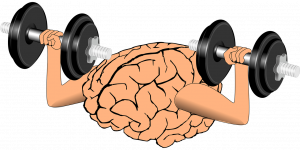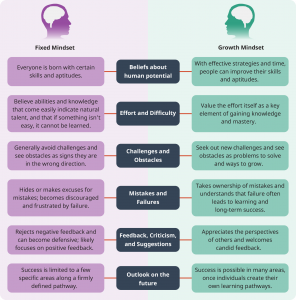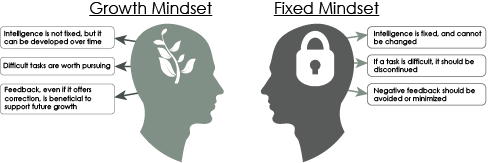22 Chapter 16: Adopting A Growth Mindset

Develop a Growth Mindset
In any academic endeavor, you will encounter times when you are faced with obstacles or difficulties. Perhaps you are taking a course that you are finding particularly difficult. Perhaps you received some difficult feedback in a grade that was lower than you expected. How can you move ahead in a way that prepares you for success?
Everyone encounters setbacks at times. When this happens, you have a choice of possible responses. Some people respond to setbacks by concluding that they may lack the ability to complete the course successfully. Others respond by concluding that the course or instructor is unfair, and blame their setback on an external force beyond their control. These responses are associated with what is called a fixed mindset.
Others respond to setbacks and negative feedback by asking what they can learn from the experience. Their focus is less on achieving a specific grade or result, and more on learning as much as possible from their experiences in college. Individuals with this mindset, which is called a growth mindset are more able to recover from setbacks and to go on to achieve greater success.
How do these two mindsets compare?
| Growth mindset | Fixed mindset |
|
|
A growth mindset is associated with successful learning. Why? The growth mindset principles are supported by what we know about the brain and learning. Adult brains continue to develop over time through learning. Working to master complex material results in the development of additional neural connections. In other words, by learning difficult material, you can actually become smarter. If you believe that you are able to succeed by working hard, you are more able to persevere through the difficult moments in learning, and continue to make progress towards your learning goals. [2] [3]
This chapter is modified from Openstax OER
Fixed vs. Growth Mindset
The research-based model of these two mindsets and their influence on learning was presented in 1988 by Carol Dweck.7 In Dr. Dweck’s work, she determined that a student’s perception about their own learning accompanied by a broader goal of learning had a significant influence on their ability to overcome challenges and grow in knowledge and ability. This has become known as the Fixed vs. Growth Mindset model. In this model, the performance-goal-oriented student is represented by the fixed mindset, while the learning-goal-oriented student is represented by the growth mindset.
In the following graphic, based on Dr. Dweck’s research, you can see how many of the components associated with learning are impacted by these two mindsets.

Figure 2.11 The differences between fixed and growth mindset are clear when aligned to key elements of learning and personality. (Credit: Based on work by Dr. Carol Dweck)
The Growth Mindset and Lessons About Failing
Something you may have noticed is that a growth mindset would tend to give a learner grit and persistence. If you had learning as your major goal, you would normally keep trying to attain that goal even if it took you multiple attempts. Not only that, but if you learned a little bit more with each try you would see each attempt as a success, even if you had not achieved complete mastery of whatever it was you were working to learn.
With that in mind, it should come as no surprise that Dr. Dweck found that those people who believed their abilities could change through learning (growth vs. a fixed mindset) readily accepted learning challenges and persisted despite early failures.
Improving Your Ability to Learn
As strange as it may seem, research into fixed vs. growth mindsets has shown that if you believe you can learn something new, you greatly improve your ability to learn. At first, this may seem like the sort of feel-good advice we often encounter in social media posts or quotes that are intended to inspire or motivate us (e.g., believe in yourself!), but in looking at the differences outlined between a fixed and a growth mindset, you can see how each part of the growth mindset path would increase your probability of success when it came to learning.
Footnotes
- 7Dweck, C.S. & Leggett, E.L. (1988). A Social-Cognitive Approach to Motivation and Personality
Put the Growth Mindset Into Practice

If you have discovered that you have a fixed mindset, consider how changing your thinking towards a growth mindset can influence your opportunities for successful learning and growth.
(1) Adjust your self-talk. A key sentence to remember is “I can’t do it — yet”. Consider feedback as information to help you as you continue to grow towards a goal, not as a final evaluation of your ability to learn and achieve.
(2) Respond to feedback differently. Rather than viewing feedback as criticism of who you are, consider feedback as an opportunity to grow.
(3) Rather than quitting when you face setbacks, use them as an opportunity to adjust your approach. You may be learning that your current approach to learning is not leading to the success you desire. Seek out support from others, and try new ways of learning. Setbacks are an opportunity to learn about yourself and to discover what ways of working will be most effective for you.
(4) Embrace challenging opportunities. Though it may at first seem easier to avoid situations that might be difficult or perhaps risk failure, embracing challenges leads to success in the long term. Consider how accepting challenges will help you become the person you want to be in the future. [4]
Try it!
Apply the thinking strategies above to a situation you are currently facing.
- What was a challenging situation I faced this semester?
- How can I think about it differently using a growth mindset?
- What are the benefits to me of adopting this new way of thinking?
Extend Your Learning
Developing a growth mindset can make a powerful difference in your lifelong learning. Explore the following resources to deepen your understanding of this concept.
1. Are you interested in understanding more about your mindset? Try this online assessment to identify whether you currently have a growth mindset.
2. Explore The Mindset Continuum infographic. As its author, James Anderson, emphasizes, fixed and growth mindsets are the end points on a spectrum of perspectives. Use this infographic to explore where you currently are on the mindset continuum, and identify areas for future growth.
- Adapted from: Dweck, C. S. (2008). Mindset: the new psychology of success. New York: Ballantine Books. ↵
- Paunesku, D., Walton, G. M., Romero, C., Smith, E. N., Yeager, D. S., & Dweck, C. S. (2015). Mind-set interventions are a scalable treatment for academic underachievement. Psychological Science, 26(6), 784–793. https://doi.org/10.1177/0956797615571017 ↵
- Yeager, D. S., & Dweck, C. S. (2012). Mindsets that promote resilience: When students believe that personal characteristics can be developed. Educational Psychologist, 47(4), 302–314. https://doi.org/10.1080/00461520.2012.722805 ↵
- Adapted from: UNSW Sydney. (n.d.). Growth mindset. Retrieved from https://student.unsw.edu.au/growth-mindset ↵

![What mindset do you have? Indicate whether you agree or disagree with the following statements: Agree Disagree You cannot change the amount of intelligence you have. Even though you can learn new things, this doesn't change how intelligent you are. You are able to change the amount of intelligence you have throughout your life. Even though you are a certain kind of person now, you can still change the important parts of who you are. The first and second statements in this chart are characteristic ways of thinking of you have a fixed mindset. The third and fourth reflect a growth mindset. <a class="footnote" title="Adapted from: Dweck, C. S. (2008). Mindset: the new psychology of success. New York: Ballantine Books." id="return-footnote-460-1" href="#footnote-460-1" aria-label="Footnote 1"><sup class="footnote">[1]</sup></a> Which mindset do you have now? How can you continue to move towards a growth mindset?](https://cod.pressbooks.pub/app/uploads/sites/111/2018/04/40-Develop-a-Growth-Mindset-791x1024.png)
